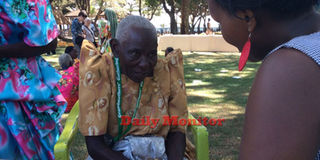The plight of grandmothers raising orphans

Ms Safina Nalubega during an interview in Entebbe on Monday. File PHOTO
ENTEBBE. Safina Nalubega, an 80-year-old widow, lost her three children to HIV/Aids about 20 years ago. They left her with 10 grandchildren with whom she lives in Mukono District. However, with a fading memory, she is unable to tell how old the grandchildren were when they were orphaned. She only recalls that the youngest child was breastfeeding when her daughter passed on. The 60-year-old then took over the responsibility of looking after them.
Ms Nalubega narrates how she had to wake up very early to go and dig not only in her garden but that of her neighbours as well so that she could fend for her grandchildren. “I needed to raise enough for their school fees and food,” she says.
While trying to make ends meet, her step children sold the plot on which she stayed forcing her and the children to become squatters on other people’s land.
“I moved with them everywhere I went until we got a place for us to live. The youngest is now 18 years,” she says with a smile of contentment.
Ms Nalubega’s story is not any different from that of many grandmothers. Whether its disease or war that has orphaned children, or when couples separate or when people are busy eking a living in urban centres, the grandmothers sacrifice to bring up the little ones.
On Monday several organisations collected 600 grandmothers from all over Uganda in Entebbe for the first Uganda National Grandmothers Gathering (October 5 to 7), aimed at celebrating their life. “We are here to celebrate how grandmothers stood in strength amidst the HIV pandemic,” said Kenneth Mugayehwenkyi, the chairman Grandmothers Gathering Organising Committee.
Mr Sulaiman Madada, the Minister of State for Elderly, pledged full government support to the elderly.
“The government is planning to increase the districts that access the elderly fund from 15 to 40. I know that this is not enough but slowly by slowly we shall reach there,” said Madada.
The 2009/10 Uganda National Household Survey (UNHS) Report estimates older persons in the country are 1.3 million of whom 54 per cent are female.
The UNHS 2005/06 also reports that 2.1 million children who ordinarily would have been raised by their parents are under the care of older persons.
The conference has been organised by six organisations, including Reach Out Mbuya Parish HIV/Aids, Reach One Touch One Ministries, Nyaka Aids Initiative, Kitovu Mobile, Phoebe Education Foundation and St Francis Health Care Services in partnership with The Stephen Lewis Foundation from Canada.
Numbers
54%
Percentage of females among the 1.3 million elederly people in Uganda.



